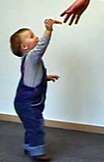Babies Fed on Demand Do Better at School
A large scale study in Britain suggests eight-year-olds who were fed on demand as infants had higher IQs -- and did better in school -- than did children who were fed on a schedule.

What is human nature? Are we basically good, evil, or a little of both? Philosophers have debated this throughout the ages, but today science delivers some definitive news. Humans are naturally altruistic.
In Germany at the Max Planck Institute for Evolutionary Anthropology, a window has been opened into human behavior. Experiments involving prelinguistic and just post-linguistic children as young as 18 months showed the toddlers to be freely and voluntarily helpful in situations where the experimenter feigned a need for help.
The situations, designed by scientists Felix Warneken and Michael Tomasello, at the Department of Developmental and Comparative Psychology, included reaching for objects that were beyond their grasp, trying to place objects in a closed cabinet while "forgetting" to open the door, or being "unable" to stack books. In each case, the infant present observed the situation and came to the aid of the experimenter, even though the scientist was a stranger and no reward was offered. Significantly, the infant often showed pleasure at having had the ability to help.
To discount the notion that this was play behavior, the scientists repeated experiments without showing a need for help. For example, when the child observed a clothespin intentionally thrown to the floor, and the scientists made no effort to pick it up, the children did not retrieve the clothespin. The children reacted only to seeing the need for help.
Click to view these incredible experiments.
We live in a society that depends upon altruism, for donations and volunteerism. Now, with this experiment, science has confirmed that humans are indeed basically a generous species. Before even being taught the reasons to do good things, we are naturally attuned to do them, for no reason at all.
Be the first to comment